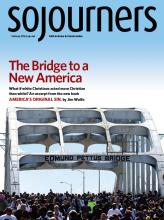IN NOVEMBER, the Fifth Circuit Court of Appeals blocked a series of Obama administration executive orders intended to shield millions of immigrants from deportation.
Of course, there’s a backstory: After the 2014 failure of Congress to pass comprehensive immigration reform, President Obama attempted to create one program, called Deferred Action for Parents of Americans and Lawful Permanent Residents (DAPA), and expand an existing one, called Deferred Action for Childhood Arrivals (DACA).
As its name suggests, DACA was created to protect children—more than 1.7 million, according to the Migration Policy Institute—who were brought to the United States before they turned 16. These “Dreamers” have become a visible and powerful political movement. DAPA is intended to provide work permits and exemption from deportation to those adults with children who are U.S. citizens or lawful permanent residents.
In the dangerous environment created by our failed immigration policy, these two protections are essential for keeping families safe and together.
But when the Obama administration announced these programs in November 2014, some states claimed that expanding the number of immigrants allowed to stay in the U.S. would cause an unfair increase in the cost of state services. Ultimately, 26 states sued to stop the DAPA/DACA changes. In November 2015, the Fifth Circuit—which covers Louisiana, Mississippi, and Texas—found in favor of the states. The Justice Department then appealed the decision to the U.S. Supreme Court, which is likely to decide the case before a new president takes office.
Immigrant and family advocates, along with religious leaders, criticized the ruling. “After the Fifth Circuit’s decision concerning DACA and DAPA, what remains abundantly clear is that the U.S. Congress needs to urgently address immigration reform,” said Gabriel Salguero, president of the National Latino Evangelical Coalition. “Hispanic Evangelicals are looking for genuine leadership on this issue. No more delays and excuses.”
Nineteen faith-based organizations (including Sojourners) filed an amicus brief with the Fifth Circuit Court to advocate alongside individuals seeking relief from deportation, and churches across the country had begun to prepare members to apply for DAPA and the expanded DACA.
Read the Full Article

